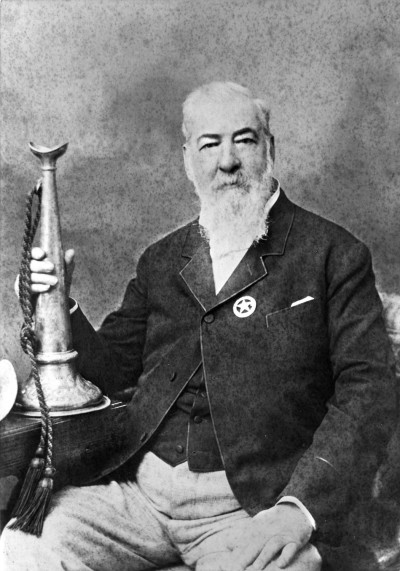Alexander Joy Cartwright, Jr (Alexander Joy Cartwright)

Alexander Cartwright led the establishment of the Knickerbocker Base Ball Club (after the Knickerbocker Fire Engine Company) in 1842. The Knickerbockers played a brand of bat-and-ball game often called “town ball” or “round ball,” but in New York more usually “base ball,” somewhat similar to but not identical to the English sport of rounders, on a field at 4th Avenue and 27th Streets. In 1845 Alexander Cartwright and a committee from his club drew up rules converting this playground game into a more elaborate and interesting sport to be played by adults. The major precepts included the stipulations that foul territories were to be introduced for the first time, and the practice of retiring a runner by hitting him with a thrown ball was forbidden. Cartwright is also erroneously credited for introducing flat bases at uniform distances, three strikes per batter, and nine players in the outfield. However, modern scholarship has cast doubt on the originality of these rules, as information has come to light about the New York clubs that predated the Knickerbockers, in particular the rules devised by William R. Wheaton for the Gotham Club in 1837. Baseball historian Jeffrey Kittel has concluded that none of the Knickerbocker Rules of 1845 was original, with the possible exception of three-out innings. As MLB’s Official Historian John Thorn wrote, Cartwright has “a plaque in the Baseball Hall of Fame on which every word of substance is false. Alex Cartwright did not set the base paths at ninety feet, the sides at nine men, or the game at nine innings.” The first clearly documented match between two baseball clubs under these rules took place on June 19, 1846, at Elysian Fields in Hoboken, New Jersey. In this match, the Knickerbockers lost to the “New York Nine” by a score of 23 to 1. Some authors have also questioned the supposed “first game” under the new rules. The Knickerbockers’ score-book shows intra-club games during 1845; the New York Base Ball Club played at least three games against a Brooklyn club in 1845 also, but the rules used are unknown.. Those who have studied the score-book have concluded that the differences in the games of 1845 and 1846, compared with the specifications of the Knickerbocker rules, are minimal.
In 1849, Alexander Cartwright headed to California for the gold rush, and then continued on to the Hawaiian Islands. His family came to join him in 1851: wife Eliza Van Wie, son DeWitt (1843–1870), daughter Mary (1845–1869), and daughter Catherine (Kate) Lee (1849–1851). In Hawaii sons Bruce Cartwright (1853–1919) and Alexander Joy Cartwright III (1855–1921) were born. He set up a baseball field on the island of Oahu at Makiki Field. Cartwright served as fire chief of Honolulu from 1850 through June 30, 1863. As advisor to King David Kalākaua and Queen Emma he encouraged the growth of baseball on the islands until his death on July 12, 1892, a year before the overthrow of the Hawaiian monarchy in 1893. One of the leaders of the overthrow movement was Lorrin A. Thurston who played baseball with classmate Alexander Cartwright III at Punahou School. He was buried in Oahu Cemetery.
Born
- April, 17, 1820
- USA
- New York, New York
Died
- July, 12, 1892
- USA
- Honolulu, Hawaii
Cemetery
- O'ahu Cemetery
- Honolulu, Hawaii
- USA



